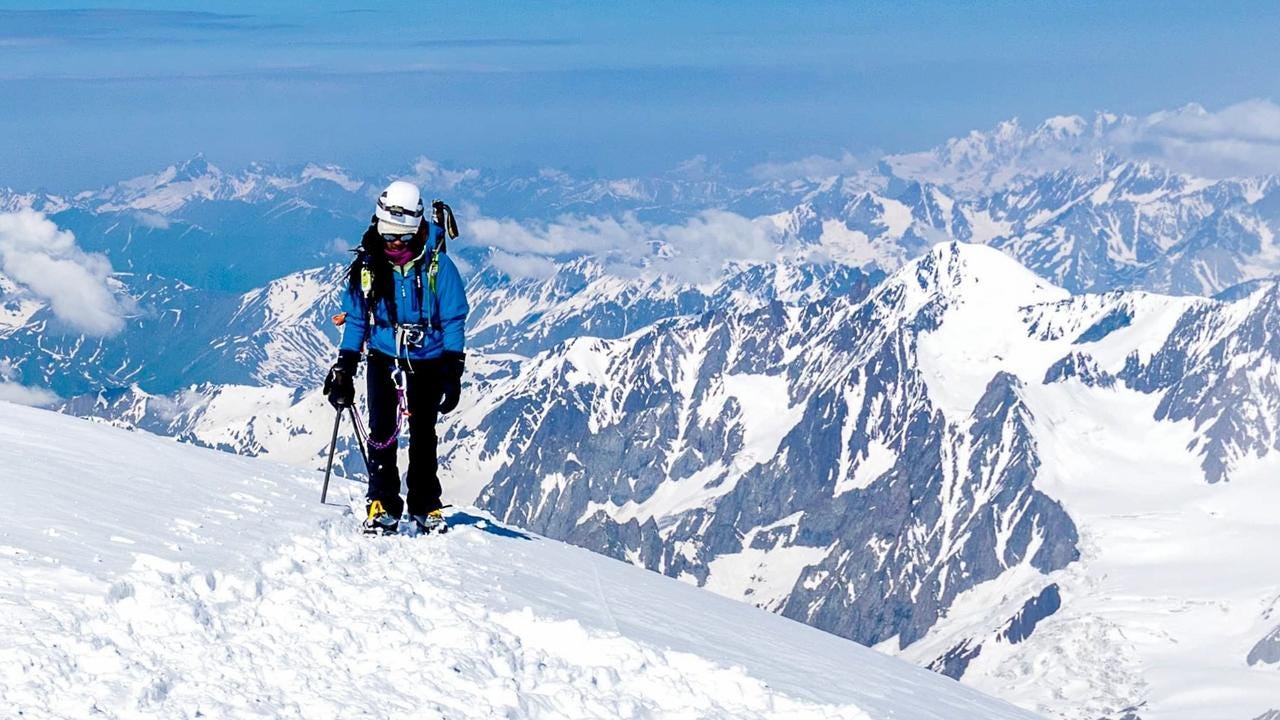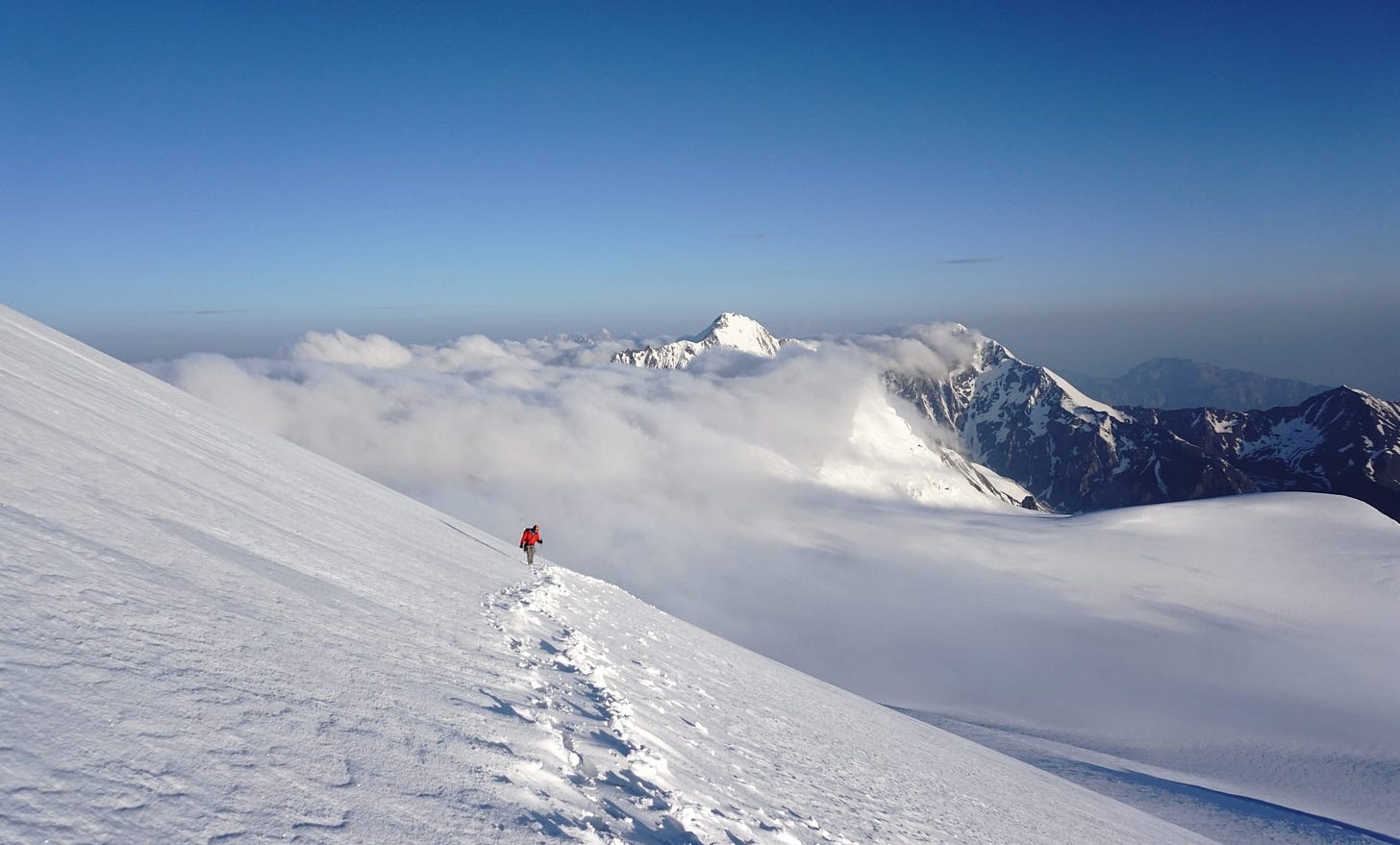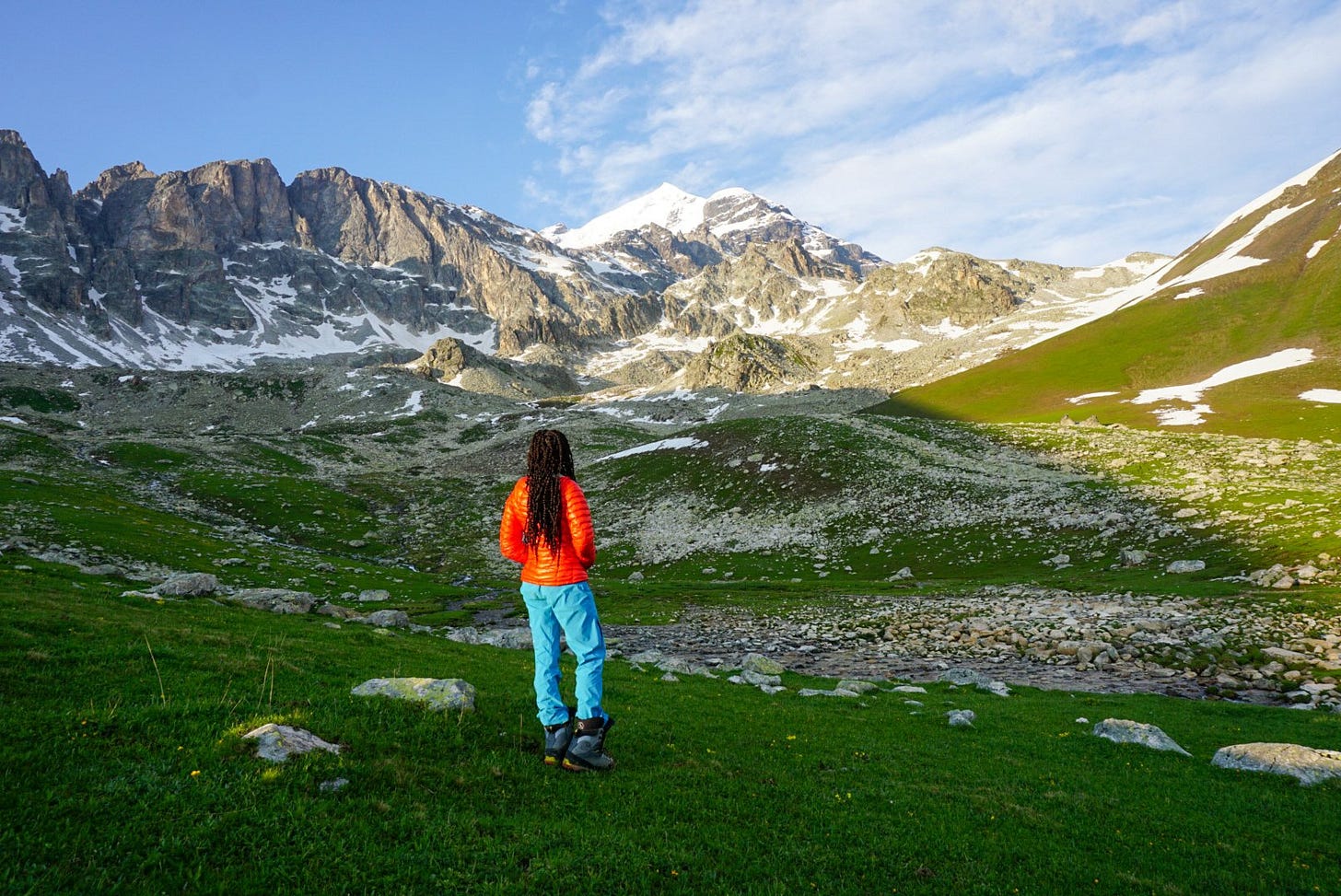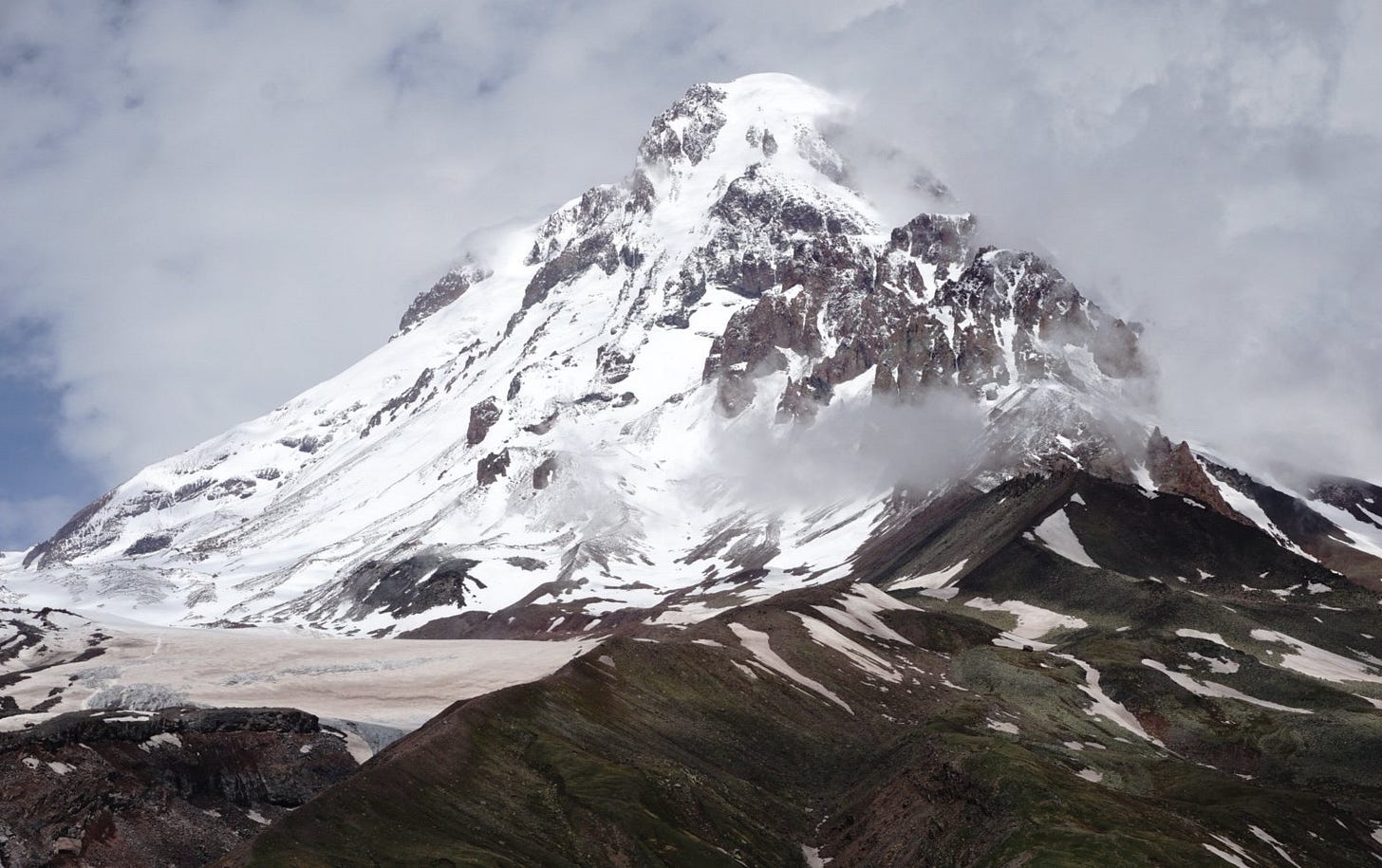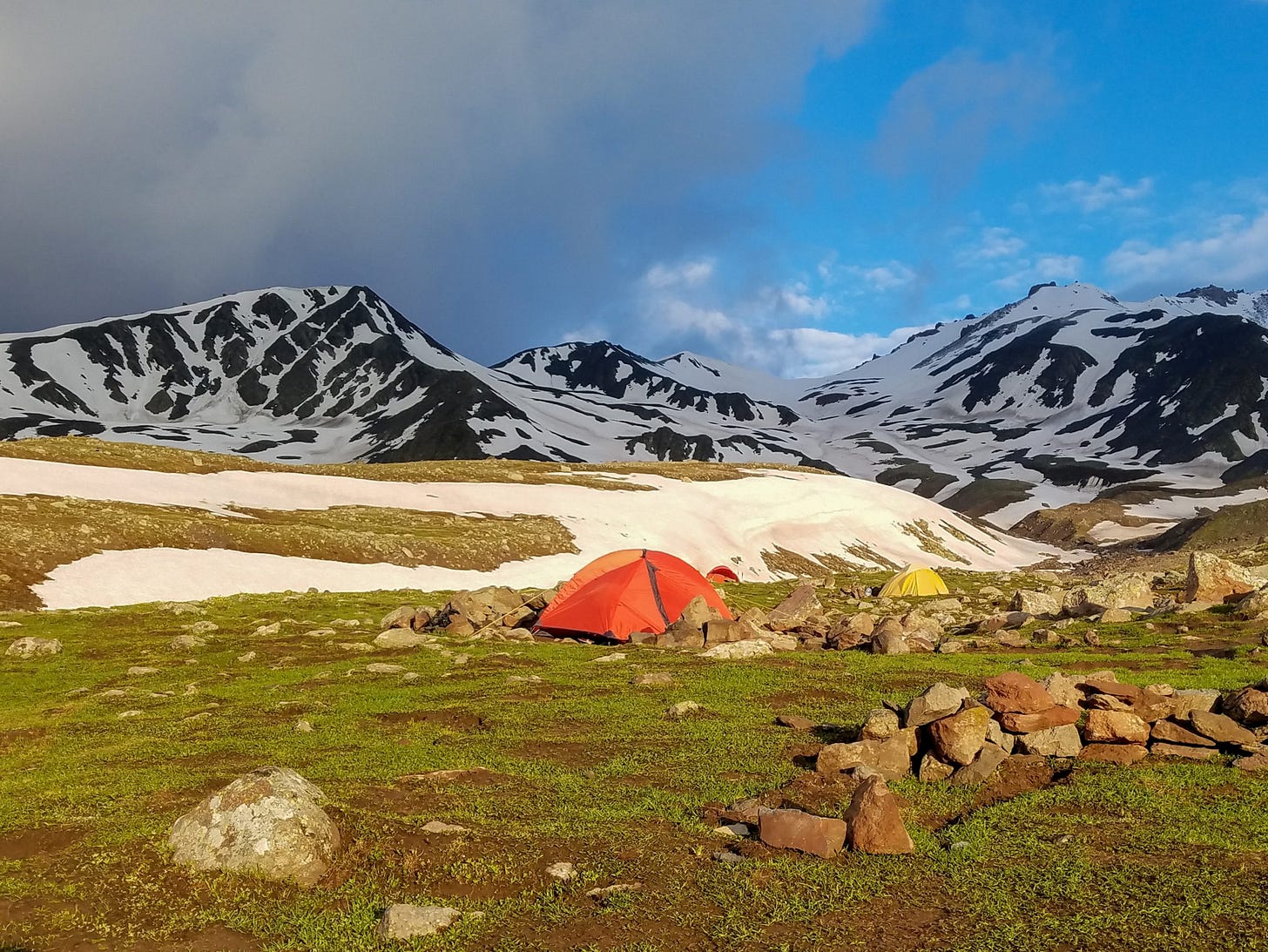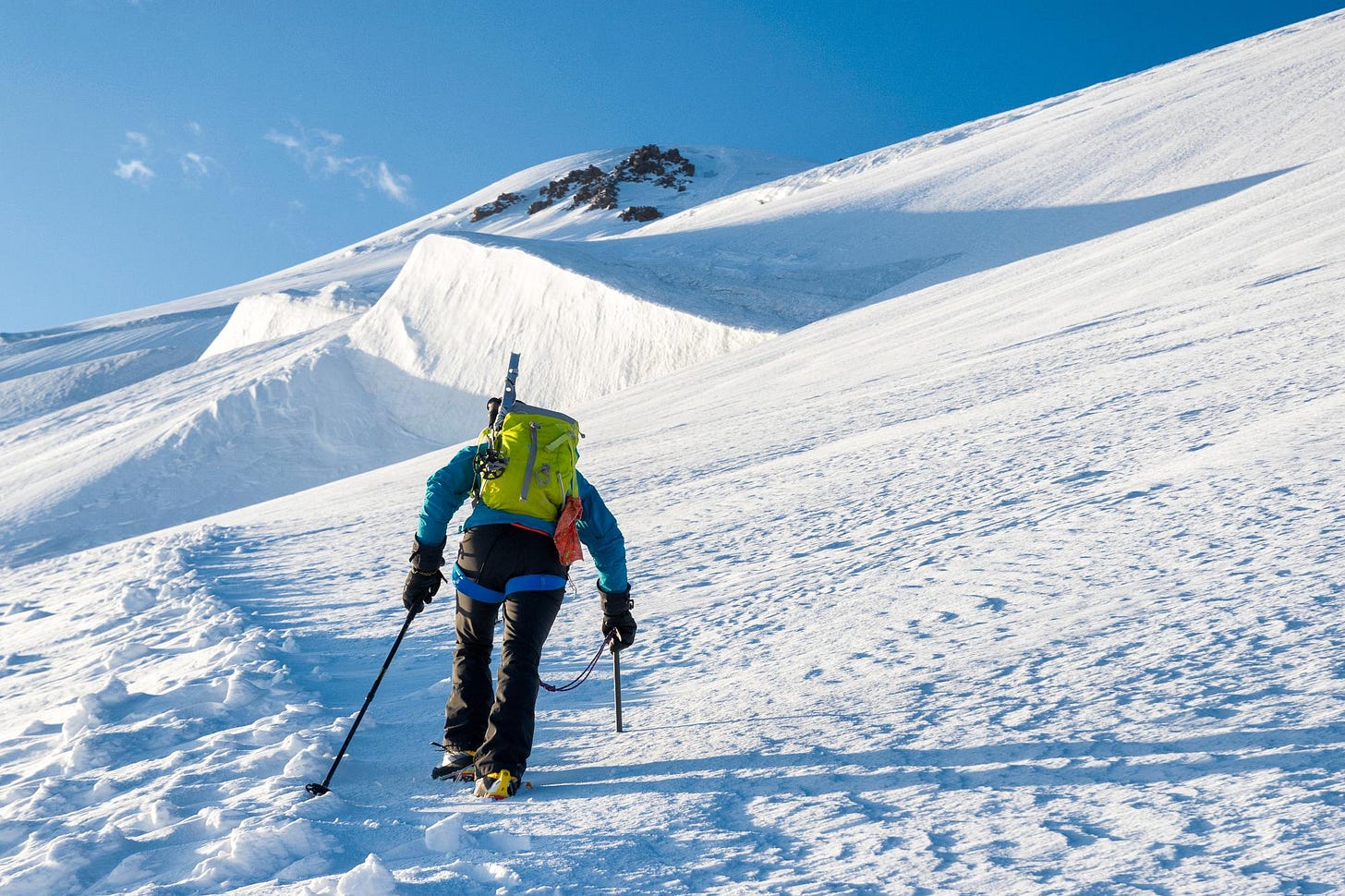Conflict in the Mountains of Georgia
My climbing expedition started at the Tbilisi Airport in the Republic of Georgia—coming down the stairs from passport control, I met my climbing partner from Turkey for the first time in person. Prior to meeting each other, we had spent months online getting to know each other, our skill levels, and planning the logistics of tackling two mountaineering objectives: Mt. Kazbek (16,512 ft) and Tetnuldi (15,938 ft). The thought of travelling to an overlooked country to climb two beautiful peaks with someone I had never met before sounded exhilarating, it sounded adventurous! What could go wrong?
We started our expedition with Mt. Kazbek located in Kazbegi. Minus falling ill to a common cold and getting severe altitude sickness which had caused fluid to build up in my lungs due to the high elevation, it was a straightforward and successful climb to the summit! It was an exhausting 25-mile climb consisting of four days of climbing and one day waiting for a weather window. After concluding our climb, we made it back down to our guesthouse, fatigued yet already preparing for Tetnuldi. From Kazbegi, we took an eight-hour bus ride back to the city of Tbilisi to take a quick breather, restock our supplies, and head out on a six-hour train ride and a four-hour marshrutka (mini bus) ride to another small town of Mestia. Packing and repacking our large duffle bags and backpacks and hauling them around became a regular routine that we absolutely loathed, but it had to be done.
During the extent of our climb we’d combined long drives consisting of a train, marshrutkas, and taxis; relocating from guesthouse to guesthouse; and constantly managing our gear. Not having time to decompress or get a moment to myself really troubled the introvert in me. And that’s when things started to go South. My habit of shutting down during moments of frustration led me to withdraw—wanting so badly to be done with Tetnuldi and to spend the remainder of my time in Georgia drinking a chilled glass of infamous Georgian semi-sweet red wine (okay – who am I kidding—a bottle of wine). My climbing partner picked up on my change in mood, causing a shift in our social dynamic.
We headed out once again to start our second climb and from then on, things changed. We completely stopped communicating, which was one of my pet peeves from the beginning, causing me to withdraw even further. Arriving at the trailhead of Tetnuldi, I dashed off ahead, giving myself time alone to calm down, but really it just fuelled my anger.
The approach to basecamp was nothing more than a simple hike, crossing over a few streams with occasional route-finding here and there. About three-hours later, we arrived at basecamp which was located at the base of immaculate granite peaks with a 360-degree view of a lush green floral landscape. How can anyone be so disgruntled in a place that would make them want to break out in song, dancing in circles because a vivid memory of The Sound of Music came to mind? Sadly, me. And my partner too for that matter, because we both made each other’s lives a nightmare for the remainder of our climbing expedition. After setting up our tent and getting settled we still had loads of time on our hands. Giving us nearly a full day to rest before a strenuous ascent to high camp that next day. It also meant a full day of boiling water, sleeping, and eating our separate meals all in silence, eventually watching the sun settle over Tetnuldi from opposite sides of our camping area.
That next day is when things got even more… let’s say interesting. We donned our helmets and warm clothes and broke down camp. Barely able to spend more than a minute in each other’s presence, I scuttled away. Scrambling over a plethora of boulders, some covered in rotten snow waiting for a leg to jab through. Since this was my first time tackling any peaks in this region, I waited for my climbing partner, who had unsuccessfully climbed this mountain in the past, to lead the way. Taking a moment to put on our crampons and replace a trekking pole with an ice axe, we started up a couloir (a steep, narrow gully on a mountainside) that involved a mixture of snow, ice, and rock. The terrain kept getting steeper, making me question my ability to continue climbing this particular peak. I watched my partner continue ahead, struggling to hoist over the rocks with his crampons. I was getting nervous. I don’t particularly do well climbing with a heavy-ass pack, especially one that is nearly half my body weight.
I stopped mid-way. My climbing partner shouted out, “Do you want me to send the rope down?”. I paused—I should be able to climb a simple 45-degree slope or at least that was the maximum steepness according to our research. This shouldn’t be intimidating; I’ve done this plenty of times. I really should be fine without a rope. I continued to pause. “Do you want the rope or not!?”, his impatience was quite audible. Pushing my pride aside and really analysing the situation, I yelled back, “Yes!”. I braced myself on the loose rocks while waiting for him to build a snow anchor to send down the rope. When the rope finally met up with me, I attached myself to it and started to climb. Once I reached the anchor, I realised there was only one picket. Based on my technical training, redundancy is vital—always having two safety points in case one fails! We were nearly 40 ft from the top of the ridge, I was mentally taxed out and knew eventually we would need to descend to get out of this nightmare; I didn’t realise it would be so soon. My partner climbed up ahead to scope out the terrain. His body language told me everything I needed to know—we had taken the wrong path! A path that was much steeper, more difficult, and led to a dead end. Realising his mistake, we had to go back down.
In order to get back down we had to plan our escape. I had him add my picket to the anchor to reinforce it before lowering me down. The 30-metre rope only reached half-way down the couloir. Once I ran out of rope, I unattached myself from the rope and waited for him to lower himself off the anchor. The plan was for him to climb down, ditch his pack, climb back up to remove the anchor, and then climb back down. A task I was thankful I wasn’t doing. On his way down, his leg fell through a patch of rotten snow—flipping backwards, he caught himself by grabbing onto the rope. The scariest and longest 30 seconds of the climb. We were so far from civilisation this incident could have turned out quite tragic. After taking a moment, he ditched his pack and headed back up to discover the original picket was yanked out of the snow when he fell, leaving my second picket in place, which is why redundancy is everything! We were stunned and thankful.
After that ordeal, we made it back down to the boulder field when it started to hail—thunder roaring above our heads with anticipated lightening. My only focus was to not be a human lightning rod with the help of my metal ice axe and picket sticking out of my pack. I planned to retrace my tracks, following a path of pathetic cairn placements. I looked back at my partner to find him ascending higher, taking a different way. I shouted, “why are you ascending?”. Through the deafening hail and thunder, he ignored me and continued upward. Moving as fast as I could over the scree and boulders while trying not to slip and break an ankle, I made it back to our camping spot. Waiting over an hour with no sign of my partner in sight, I started to worry. Is he waiting for me? Did he get hurt? Is he ahead of me, heading back down to the trailhead? My mind was spinning. I looked at the time and was about to give it another 20 minutes before I had to take action.
At last, I saw him heading towards me. Taking a moment to regroup, we immediately broke out into an argument. We had been irritably waiting for each other in different spots, causing our socks to become drenched despite wearing our double insulated mountaineering boots. With an intense storm rolling in, missing our precious weather window, wet socks, miscommunication and time lost, the climb had to be terminated. We were both furious and wanted off the damn mountain.
Finally, we made it back down to Mestia where we were now faced with six extra free days. Our shared room at the guesthouse suddenly seemed problematic. It felt like neither one of us wanted to share the same oxygen. Since he had booked the only room available and planned on staying in Mestia for a while, I had to decide if I wanted to relocate to another guesthouse or not. Being far too lazy to repack, once again, and drag my bags to another place, I opted to stay put. That evening I spent a single night out in self-sorrow and relief, at last imbibing in a bottle of extremely overpriced wine that was clearly sold to foolish tourists.
That next morning, I woke up with a foggy head and needing to clear my conscience. I realised I had to make things right. Throughout the rest of our time spent in Georgia, we discussed our transpired frustrations and differences. We realised we were both overwhelmed with the constant traveling and mentally exhausted from Mt. Kazbek—Tetnuldi didn’t have our full attention nor motivation. Burn out caused us to spiral and take our frustrations out on one another. In retrospect, we should have spaced our climbs further apart, avoiding our pseudo-marital spat. Every day we spent exploring Georgia we truly got to know each other and better understand each other’s personalities. We turned over a new leaf, putting the past behind us and learning from the experience.
With everything said and done it was still an amazing expedition. And, believe it or not, our argument, and thankfully, our ability to reconcile our differences allowed us to become incredibly great friends. Who knows, we may just find ourselves climbing together in the future!
Written by Rebecca Ross: Rebecca has a master’s degree in public health, epidemiology from Oregon Health & Science University. She has only been climbing since 2017, but don’t let her late start in climbing deceive you. She has completed a number of mountaineering and alpine safety courses since then and has been tackling high-elevation peaks internationally. She was awarded a Mazama’s grant to lead her first successful expedition up Pico de Orizaba (~18,500’) in Mexico in 2018.
She also received the Guide Like Liz scholarship for the American Mountain Guides Association (AMGA) Leadership course and received both the Live Your Dream grant to climb in the Republic of Georgia and the McNeill-Nott grant to lead another mountaineering expedition in Mongolia in 2020. When she is not climbing local cascade peaks or planning her next expedition, you can find her focusing on her career, conducting community health outreach projects abroad.


